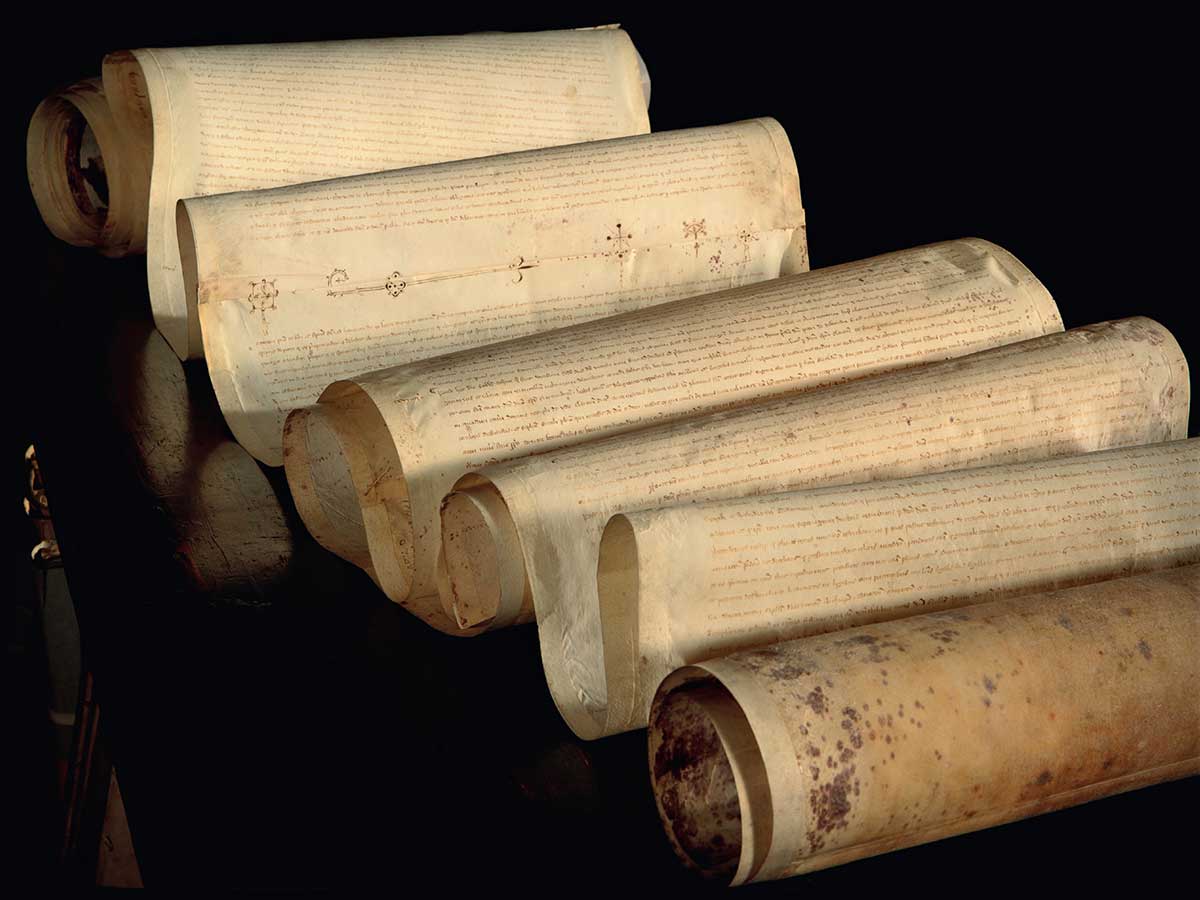It is due to Pope Francis that the Vatican Archives are no longer ‘secret’ but ‘apostolic.’ On 28 October 2019, Pope Francis issued an Apostolic Letter motu proprio dated 22 October changing the name Vatican Secret Archive to Vatican Apostolic Archive (Latin: Archivum Apostolicum Vaticanum).
It is not the first time that the name for the famous collection of private documents changes: from the Bibliotheca Secreta del Romano Pontefice, that is the part of the writings reserved for the pope, it was then described as the New Archives (Archivum novum), then again as the Apostolic Archives (Archivum Apostolicum), and finally when these texts have been grouped together and divided from the Apostolic Library in the 17th century, the collection of documents went under the name Secret Archives (Archivum Secretum).
Substantially nothing about its identity has been changed or lost by dropping Secret (Secretum), because even in the new title Pope Francis gave it, it continues to be the private Archives of the Pope (therefore, Apostolic), subject to him alone and to his exclusive governance. It remains one of the oldest institution and one of the largest archives in the world which will continue to conserve Papal and Curial documents and to guard thousands of years of history.
The use of the word "secret" in the former title, "Vatican Secret Archive", does not denote the modern meaning of confidentiality. A fuller and perhaps better translation of the Latin may be the "private Vatican Apostolic archive", indicating that its holdings are the Pope's personal property. The word "secret" continues to be used in this older, original sense in English like in “secretary". The meaning of the Holy Father’s decision is well expressed in the motu proprio of October 22nd 2019, issued on October 28th and pasted below, which changed the centuries-old title of the Archivum Secretum Vaticanum, the Vatican Secret Archives, to the Vatican Apostolic Archives. The new name is a better reflection of the archive's "service to the church and the world of culture," the pontiff said. The Latin name Archivium Secretum — originally meant to convey that the archive was private — had come to connote something more sinister and could conjure up hidden mysteries enclosed in obscure and underground vaults."The word 'secretum' having lost its true meaning and instinctively being associated with the modern concept of the word 'secret,' assumed the prejudicial acceptance of being hidden, not revealed and reserved for a few…That is completely contrary to what the Vatican Secret Archive always was and intended to be," Francis said.
Parts of the archive do, however, remain truly secret (or "classified" in a modern context)….and a hint of this intriguing situation will be revealed during a guided tour there.
The archives are located inside the Apostolic Palace but they also include frescoed galleries, the underground bunker, the breathtaking Vatican’s first astronomy tower, the 200-foot-high Tower of the Winds where the Gregorian calendar Reform was promoted.
The documents preserved cover more than 12 centuries of world history, almost without interruption, from the eighth century to the present in some 600 collections organized across 53 miles (85 kms) of shelving, with over 35,000 volumes in the selective catalogue alone.
The archives contain records of an extraordinary historical value such as letters written by the popes, papal registers, notable documents like Henry VIII of England's request for a marriage annulment, or the handwritten transcript of the trial of Galileo for heresy, letters from Michelangelo complaining he had not been paid for work on the Sistine Chapel, documents related to Raphael, Bernini, Tintoretto, documents from emperors, kings and queens of Europe like the last letters from queen Mary, Queen of Scots, or Marie Antoniette written while awaiting their own executions, or regarding coronation of Napoleon Bonaparte, the trial of the knights templars, bulls of excommunications, as the one of Martin Luther, letters from Jefferson Davis, Abraham Lincoln, Gran Khan Guyuk…just to name a few.
In a new law, Pope Francis opened the controvertial archive of Pius XII, from 1939 to 1958 (including World War II), a Pope accused by some of not speaking out enough about the Holocaust, and documents were made avaialbe to researchers from March, 2nd 2020.
Historical experience teaches us that every human institution, created with the best protection and with vigorous and well-founded hopes for progress, fatally touched by time, precisely to remain faithful to itself and to the ideal aims of its nature, feels the need, not to change its features, but to transpose its inspirational values into different eras and cultures and to make those updates that become convenient and sometimes necessary.
Even the Vatican Secret Archives, for which the Roman Pontiffs have always reserved solicitude and care on account of the immense and important documentary heritage that it preserves, so precious for the Catholic Church as well as for universal culture, cannot escape such inevitable conditioning, in its now more than four centuries-long history.
The Pontifical Archive, which arose from the documentary nucleus of the Apostolic Chamber and of the Apostolic Library itself (the so-called Bibliotheca secreta) between the first and second decade of the 17th century, began to be called the Secret (Archivum Secretum Vaticanum) only around the middle of that cen. It was accommodated in suitable rooms in the Apostolic Palace, grew over time to a remarkable extent and was immediately opened to requests for documents that came to the Roman Pontiff, to the cardinal Camerlengo and then to the cardinal Archivist and Librarian from all over Europe and the world. While it is true that the official opening of the Archive to researchers from every country was only in 1881, it is also true that between the 17th and 19th centuries many scholarly works could be published with the help of faithful or authentic documentary copies that historians obtained from the custodians and prefects of the Vatican Secret Archive. So much so that the famous German philosopher and mathematician Gottfried Wilhelm von Leibniz, who also drew from it, wrote in 1702 that it could be considered in a certain way the Central Archive of Europe (quod quodam modo totius Europae commune Archivum censeri debet).
This long service rendered to the Church, to culture and to scholars from all over the world has always earned the Vatican Secret Archives esteem and gratitude, all the more so since Leo XIII's death today, both because of the progressive “opening” of documentation made available for consultation (which from 2 March 2020, by my provision, will extend until the end of the pontificate of Pius XII), and because of the increase in the number of researchers who are admitted daily to the Archives and helped in every way in their research.
This worthy ecclesial and cultural service, greatly appreciated, responds well to the intentions of all my predecessors, who according to the times and possibilities have favoured historical research in this vast Archive, equipping it, according to the suggestions of cardinal archivists or prefects pro tempore, with staff, resources and also with new technologies. In this way the structure of the Archive itself has gradually grown in view of its ever more demanding service to the Church and to the world of culture, always remaining faithful to the teachings and directives of the Popes.
However, there is one aspect that I think could still be useful to update, reaffirming the ecclesial and cultural aims of the mission of the Archives. This aspect concerns the very name of the institute: Vatican Secret Archive.
Born, as mentioned, from the Bibliotheca secreta del Romano Pontefice, that is, from the part of codes and scriptures more particularly owned and under the direct jurisdiction of the Pope, the Archive was entitled first simply Archivum novum, then Archivum Apostolicum, then Archivum Secretum (the first attestations of the term date back to about 1646).
The term Secretum, which has become the institution’s proper name and which has prevailed in recent centuries, was justified because it indicated that the new Archive, created at the behest of my predecessor Paul V around 1610-1612, was none other than the Pope's private, separate, reserved archive. This is how all the Popes always intended to define it, and this is how scholars still define it today, without any difficulty. This definition, moreover, was widespread, with similar meaning, in the courts of kings and princes, whose archives were defined indeed as secret.
As long as there was still an awareness of the close link between the Latin language and the languages that derive from it, there was no need to explain or even justify this title of Archivum Secretum. With the progressive semantic changes that have however occurred in modern languages and in the cultures and social sensibilities of different nations, to a greater or lesser extent, the term Secretum in relation to the Vatican Archive began to be misunderstood, to be coloured with ambiguous, even negative nuances. Having lost the true meaning of the term secretum and instinctively associating its value with the concept expressed by the modern word “secret”, in some areas and environments, even those of a certain cultural importance, this term has taken on the prejudicial meaning of secret, as in not to be revealed and reserved for a few. This is entirely the opposite of what the Vatican Secret Archive has always been and intends to be, which – as my holy predecessor Paul VI said – preserves “echoes and vestiges” of the passage of the Lord in history (Teachings of Paul VI, I, 1963, p. 614). And the Church “is not afraid of history but, rather, she loves it, and would like to love it more and better, as God loves it!” (Address to the Officials of the Vatican Secret Archives, 4 March 2019: L'Osservatore Romano, 4-5 March 2019, p. 6).
Requested in recent years by some esteemed prelates, as well as by my closest collaborators, and having also listened to the opinion of the Superiors of the same Vatican Secret Archive, with this my Motu proprio I decide that:
From now on the present Vatican Secret Archive, without prejudice to its identity, its structure and its mission, should be called the Vatican Apostolic Archive.
Reaffirming its active desire to serve the Church and culture, the new name highlights the close link between the Roman See and the Archive, an indispensable instrument of the Petrine ministry, and at the same time underlines its immediate dependence on the Roman Pontiff, as is already the case in parallel for the name of the Vatican Apostolic Library.
I order that this Apostolic Letter in the form of a Motu proprio be promulgated by publication in the daily newspaper L’Osservatore Romano, coming into immediate force upon publication, so as to be immediately incorporated into the official documents of the Holy See, and that, subsequently, it be inserted into the Acta Apostolicae Sedis.
Given in Rome, at Saint Peter’s, on 22 October 2019, seventh of our Pontificate.
Francis







